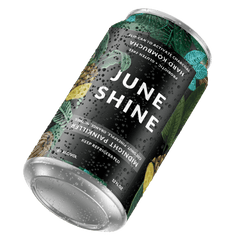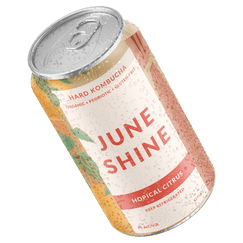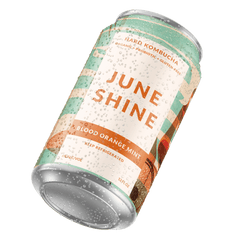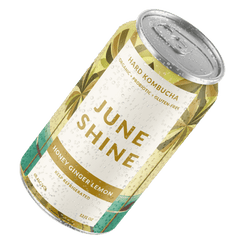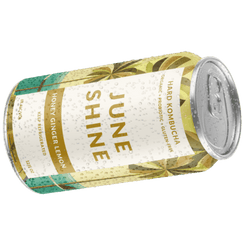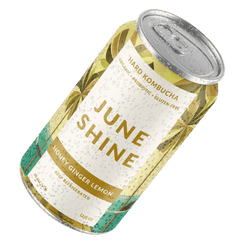What You Need To Know About Kombucha Ingredients

Kombucha, how we adore you. That tart, dry flavor, and fizzy finish—but what makes kombucha that way?
Follow along as we tell you what you need to know about kombucha ingredients.
Kombucha Ingredients: The Sparknotes Version
At its core, kombucha is a tea—a fermented tea. Fermented is a fancy word that applies to foods or beverages that have gone through controlled microbial growth. It’s a process that has been going on for at least 10,000 years.
While the process of making kombucha varies wildly from brand to brand, there are a few common ingredients across the board: tea leaves, bacteria, yeast, and sugar.
What Is SCOBY?
Rule #1: You can’t have kombucha without SCOBY. One of the main ingredients in kombucha, SCOBY is an acronym that stands for symbiotic colony of bacteria and yeast.
Symbiotic in the context of kombucha brewing refers to the yeast and bacteria strains living together in a complex and mutually supportive community that depends on each other.
Different kombuchas contain different strains of bacteria and new yeast species, but they all act in a similar way to make kombucha.
Once all the ingredients of kombucha are mixed in a jar or container with a lid, the batch is set aside to ferment at room temperature, out of direct sunlight. That’s when all the good stuff like probiotics and antioxidants starts to show up. The bacteria and acids that form on the top are the SCOBY.
A Starter Tea
The type of tea used in the kombucha brewing process will affect the taste and quality of the drink, although it doesn’t really matter whether you use loose tea or tea bags.
However, kombucha tea requires minerals and nitrogen that can only be found in real tea, AKA Camellia sinensis. Herbal tea is a no-go.
Sugar or Honey
It’s very trendy to try to find ways of avoiding sugar these days, but you need a bit of it in order to ferment kombucha. If you don’t use enough, the SCOBY won’t survive the process. Luckily, the longer the kombucha is fermented, the less sugar will be left in the final product.
Different kombucha producers use different sugars, too. Organic white cane sugar is a popular choice, since it’s pure and free of minerals. Brown sugar is less refined and contains molasses, and makes for a yeastier cup of booch. Some use agave, maple, coconut, and other sugars extracted from plants or trees, but the results can be inconsistent.
Substitutes like Stevia or artificial sweeteners are not used because there are not enough nutrients to feed the SCOBY.
JuneShine is different from the pack when it comes to most of our ingredients, and the same can be said about this. We swear by our organic ingredients, and nothing’s more organic than pure honey.
If that sounds too sweet, don’t worry. Most of the sugar is taken up by the yeast and turned into ethanol, which is how we get our kombucha to 6% ABV. The residual sugar content in one of our classic flavors is anywhere from one to four grams in a 12-ounce serving.
Bringing the Flavor
JuneShine hard kombucha is different because we are organic, sustainable, and gluten-free.
And when we say organic, we mean it. We don’t put anything you can’t pronounce in our kombucha. Unless, that is, you can’t pronounce green tea, honey, Jun Kombucha, a touch of organic cane sugar, or flavored fruit juices, herbs, and spices for flavor.
There are no additives, no preservatives, no “natural flavors,” no coloring, no rice syrup, no vinegar, and no corn syrup in our kombucha recipe.
We also love fermentation so much that we do it twice. Once with our unique Jun Kombucha SCOBY to create a clean kombucha base, then with a second fermentation with yeast and honey for an extra burst of carbonation.
After that, it’s just the juices and spices to differentiate our unique flavors: Midnight Painkiller, Blood Orange Mint, Hopical Citrus, Acai Berry, and Grapefruit Paloma. The same goes for our seasonal flavors.
One Last Thing…
The quality of a kombucha comes down to its ingredients, whether it’s traditional booch or the hard stuff. From the tea to the SCOBY, it’s vital that you’re choosing real, organic ingredients—like the ones we use.
Sources:
Kombucha | Food Source Information
Bee Seasonal | Organic Honey - Buy Honey - Raw Honey - Bulk Honey
What Is Kombucha? | Kombucha Bacteria & Yeast | Culturesforhealth.com
